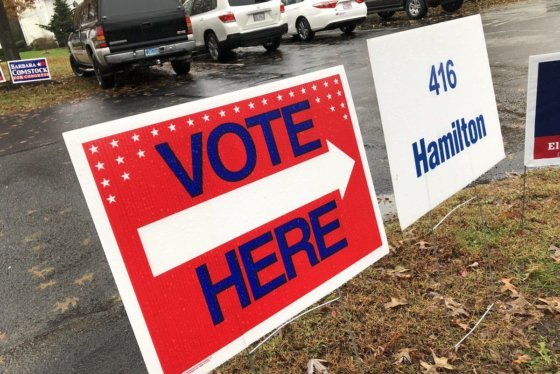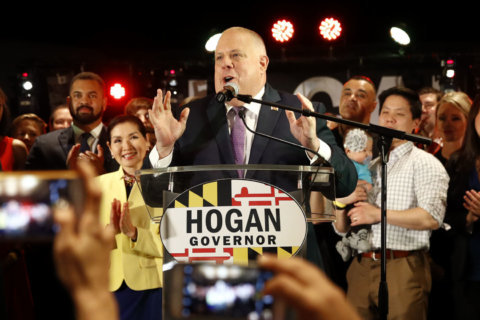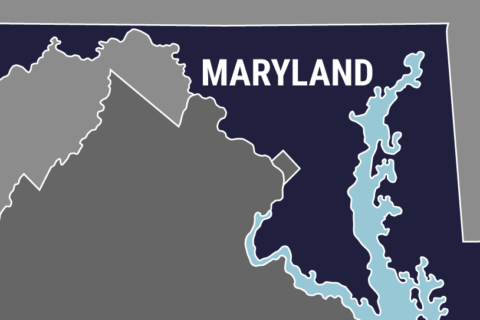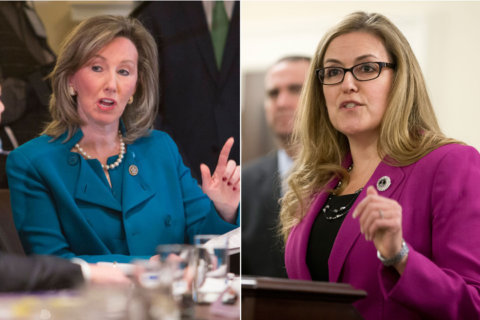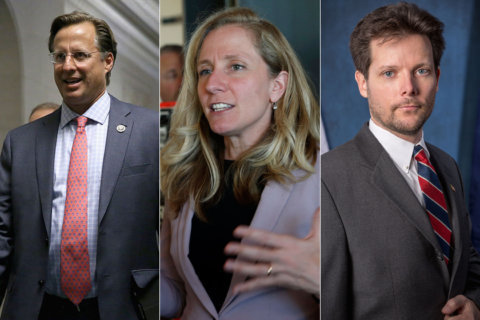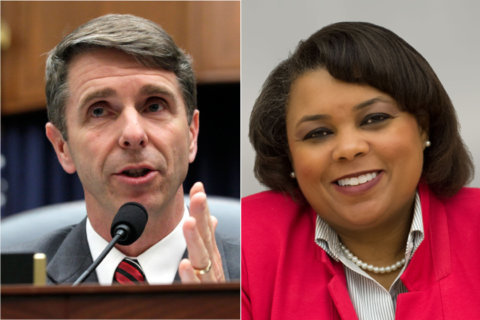A majority of voters casting midterm election ballots in Maryland and Virginia said the country is headed in the wrong direction, according to a wide-ranging survey of the American electorate.
As voters cast ballots for U.S. Senate and members of Congress in Tuesday’s elections, AP VoteCast found that 37 percent of Virginia voters and 30 percent of Maryland voters said the country is on the right track, compared with 62 percent and 70 percent, respectively, who said the country is headed in the wrong direction.
Here’s a snapshot of who voted in those two states and why, based on preliminary results from AP VoteCast, an innovative nationwide survey of about 138,000 voters and nonvoters conducted for The Associated Press by NORC at the University of Chicago.
___
MARYLAND’S RACE FOR GOVERNOR
Voters under 45 were split between Republican Larry Hogan, the incumbent, and Democrat Ben Jealous in the race for governor. Voters ages 45 and older were more likely to favor Hogan.
Black voters favored Jealous, a former NAACP president, while Hispanic voters were divided in their support. White voters overall preferred Hogan.
Whites without a college degree supported Hogan. In addition, white college graduates supported Hogan.
Hogan was seeking to become the first Republican re-elected to the state’s highest post since 1954. Jealous was vying to become Maryland’s first black governor.
Jonathan Epps, a mason with Baltimore’s public works department, was one of numerous African-Americans in the majority black city who told The Associated Press they backed Hogan. “With Hogan, you know what you’re getting. I just trust his leadership and it seems every time we have a Republican in control of this state things just seem to work better,” said Epps, a 45-year-old father of seven.
Epps said Hogan won his vote because he is the rare Republican politician who routinely champions centrist positions while freely criticizing Trump.
Rose Monroe, a retired English professor at Baltimore City Community College, said she voted for Jealous because she though he would focus on Baltimore more than Hogan has done. Monroe said the city desperately needed a robust mass transit system yet Hogan scrapped a $3-billion Red Line light rail project that she thinks would have transformed transportation in Baltimore. She also said education and economic opportunities had to be improved for young people.
“There are things I like about Hogan, but ultimately I don’t think he cares much about Baltimore City. I think Jealous would be more concerned. I think he’s more aware that the city needs more help,” said Monroe, whose lapel pin read: “Vote, It’s a Serious Matter.”
___
VIRGINIA’S SENATE CONTEST
Democrat Sen. Tim Kaine won re-election, turning back a challenge by firebrand Republican Corey Stewart. A former governor, Kaine had entered the race heavily favored against Stewart, a conservative provocateur who styled himself after President Donald Trump but who received little help from national Republicans and the White House during the campaign.
Whites with a college education preferred Kaine, and whites without a college degree modestly supported Stewart.
Kaine was preferred among black voters and led among Hispanic voters.
Voters under 45 were more likely to favor Kaine; those ages 45 and older modestly supported Kaine.
MARYLAND’S SENATE CONTEST
In his quest for a third Senate term, Democrat Ben Cardin had an edge over Republican Tony Campbell among white voters. Whites with a college education supported Cardin, and whites without a college degree leaned toward Campbell, a Towson University politics lecturer and former U.S. Army chaplain.
Cardin led among black voters and also was preferred among Hispanic voters.
Voters under 45 preferred Cardin; those ages 45 and older favored Cardin.
Neal Simon, a business executive from Potomac, Maryland, also ran as an unaffiliated candidate.
___
TOP ISSUE: HEALTH CARE
Health care was at the forefront of voters’ minds: About a third named it as the most important issue facing the nation in this year’s midterm elections. Others considered immigration (2 in 10), the economy (nearly 2 in 10), gun policy (1 in 10) and the environment (nearly 1 in 10) the top issue.
Marion O’Connor, of Oxon Hill, Maryland, said she voted for Ben Jealous for governor because of the Democrat’s proposal for Medicare for all. “I do believe everyone should be covered under some type of a plan, and it should be affordable,” she said during early voting. “It shouldn’t have to break the bank for children or seniors or even the working to have health care.”
In Virginia, Anthony Jackson, a 26-year-old former Navy cook, said he’s a Democrat who sometimes votes for Republicans. But he said the Democrats’ positions on health care and preserving the Affordable Care Act drove him to vote for a Democrat in a key Virginia congressional race. Of health care, he said, “I feel that should be everyone’s common denominator.”
“A lot of people who can’t afford health care should get free health care,” Jackson added.
___
STATE OF THE ECONOMY
Voters have a positive view of the nation’s current economic outlook — 6 in 10 said the nation’s economy is good, compared with about a third who said it’s not good. Doug Roberts, 62, of Norfolk, Virginia, said he voted Republican to protect President Donald Trump’s momentum and the economy. “I feel that things are going pretty well over all and I want to keep it that way,” Roberts said.
___
TRUMP FACTOR
For about a third of voters in both Maryland and Virginia, President Donald Trump was not a factor they considered while casting their vote. By comparison, nearly 7 in 10 Virginian voters and 6 in 10 Maryland voters said Trump was a reason for their vote.
Barbara Stortz, of Annapolis, Maryland, said she usually only votes in presidential years, but came out to vote an all-Democratic ticket this election cycle because of her concerns about Trump. “Honestly, I usually only turn out for the presidential election, but I’m just really incredibly disappointed, and I have so many words about who’s in charge running our country right now,” she said.
Ross Noe, a 55-year-old financial underwriter from Goochland, Virginia, said he voted for Democrats in Virginia’s Senate race and the 7th District Congressional Congress over concerns about Trump. “I am just very afraid of some of the decisions being made in Washington, said Noe.
___
CONTROL OF CONGRESS
Tuesday’s elections will determine control of Congress in the final two years of Trump’s first term in office, and nearly three-quarters of Maryland and Virginia voters said which party will hold control was very important as they considered their vote. Another 20 percent said it was somewhat important.
In Maryland, David Trone, a Democrat and co-owner of a national wine store chain, ran for the state’s only open House seat in District 6. He defeated Amie Hoeber, a Republican and national security consultant, with 57.7 percent of the vote.
All 141 seats in the Maryland House of Delegates were being decided. Democrats needed to keep 85 seats to have the three-fifths vote needed to override a veto from the governor.
In Virginia, Richmond-area Republican U.S. Rep. Dave Brat, was defeated by Democratic newcomer and former CIA operative Abigail Spanberger, one of a record number of women running for Congress this year.
In Hampton Roads, former Navy SEAL and freshman GOP U.S. Rep. Scott Taylor was upset by Democrat Elaine Luria, who spent 20 years on active duty in the Navy.
___
AP VoteCast is a survey of the American electorate in all 50 states conducted by NORC at the University of Chicago for The Associated Press and Fox News. The survey of 4,066 voters and 702 nonvoters in Virginia was conducted Oct. 29 to Nov. 6, concluding as polls close on Election Day. It combines interviews in English or Spanish with a random sample of registered voters drawn from state voter files and self-identified registered voters selected from opt-in online panels. Participants in the probability-based portion of the survey were contacted by phone and mail, and had the opportunity to take the survey by phone or online. The margin of sampling error for voters is estimated to be plus or minus 1.9 percentage points. All surveys are subject to multiple sources of error, including from sampling, question wording and order, and nonresponse. Find more details about AP VoteCast’s methodology at http://www.ap.org/votecast.
___
Online:
For AP’s complete coverage of the U.S. midterm elections: http://apne.ws/APPolitics
Associated Press writer Ben Finley in Norfolk, Virginia, contributed to this report.
Copyright © 2026 The Associated Press. All rights reserved. This material may not be published, broadcast, written or redistributed.

